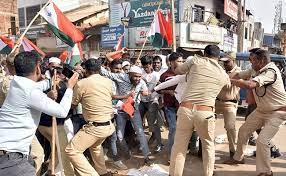Violent front: On the Popular Front of India
The Popular Front of India invokes the Constitution and engages in violence at the same time
On September 22, the National Investigation Agency (NIA) arrested over 100 leaders and activists of the radical Islamist outfit, the Popular Front of India (PFI), after raids in 15 States. The PFI claims to be a ‘neo-social movement’, but its rhetoric and activities have left little doubt about its true nature. The latest demonstration of its violent, and threatening, character was seen the next day after the raids, when it called for a hartal. The PFI continuously invokes the Constitution, democratic values and rule-of-law, but all that cannot camouflage the violence in its action and speech as unleashed in Kerala last week. Kerala is its cradle and launch pad. Extremely provocative slogans and speeches formed part of the protest. The PFI and the Social Democratic Party of India (SDPI) which acts as its political front, often deny their association, as unconvincingly as their claims of being on the right side of the law and democracy. The NIA has accused the PFI and its affiliates of conspiring to foment hostility between different religions and groups, thereby disrupting public tranquillity and causing disaffection against India. The agency, which has so far registered 19 PFI-related cases, charge-sheeted 355 people and secured the conviction of 46, has charged them with propagating an alternative justice delivery system justifying violence, instigating vulnerable youth to join banned terror outfits such as al-Qaeda and conspiring to establish Islamic rule in India.
During these searches on the outfit and its members, the NIA claims to have seized a hit list of prominent leaders of a particular community. Going by the claims of the enforcement agencies, the outfit has been continuously indulging in unlawful activities, ever since the Narath arms training case of 2013 in which members of the PFI and SDPI were convicted for organising a terrorist camp with the intent to train youth in explosives and weapons use. In 2020, some PFI members were arrested for their alleged role in inciting people during the Delhi riots. The outfit also faces the charge of raising money domestically and overseas to fund its operations, thus attracting money laundering investigations by the Enforcement Directorate. As it turns out, the rise of the PFI-SDPI axis is being resisted by moderate Muslim organisations. These outfits are profiting from the sense of insecurity among Muslims caused by Hindutva aggression and allied Government measures that seem prejudiced and fuelled by majoritarian politics. The state must act against radicalism of all kinds, rather than being selective in its approach to communal hate.
(Source: The Hindu, it is meant for educational purposes only)
